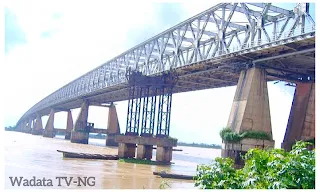PROACTIVE MEASURES TO MINIMIZE FLOODING IN MAKURDI
"Communities along the River Benue and particularly in Makurdi, Nigeria, are susceptible to flooding, particularly during the rainy season. It is important for residents to take proactive measures to minimize the impact of flooding".
Here are some steps that the affected areas can take prior to the flooding in Makurdi:
1. Stay informed: Communities should stay informed about weather forecasts and flood warnings issued by relevant authorities. This will help them prepare and take necessary precautions.
2. Evacuate: Residents in low-lying areas or areas prone to flooding should consider evacuating to higher ground or safer areas before the flooding begins.
3. Secure property: Residents should secure their property by moving valuable items to higher ground or elevated areas. They should also secure any loose outdoor items that could become projectiles during the flood.
4. Sandbags: Sandbags can help to keep water out of homes and buildings. Residents can fill sandbags with soil or sand and place them around doors, windows, and other openings to prevent water from entering.
5. Install flood gates: Flood gates can be installed at the entrance of homes and buildings to prevent floodwater from entering.
6. Raise electrical outlets and switches: Electrical outlets and switches should be raised above the expected flood level to prevent electrical shock hazards.
7. Disconnect electrical appliances: Residents should disconnect electrical appliances and equipment to prevent damage from power surges or floodwater.
8. Secure water sources: Residents should ensure that their water sources are safe and secure. This includes wells, boreholes, and water tanks.
9. Food and water supply: Communities should stock up on food and water supplies that will last for at least a few days.
10. First aid kits: Residents should prepare first aid kits with essential medical supplies, including medications, in case of emergencies.
FLOODING IN RIVER BENUE11. Communication: Communities should have a means of communication, such as a two-way radio or a cell phone, to stay in touch with emergency services and loved ones.
12. Personal hygiene: Residents should have a supply of clean water, soap, and sanitary products to maintain personal hygiene during the flood.
13. Livestock and pets: Residents should make arrangements for the safekeeping of their livestock and pets during the flood.
14. Personal documents: Residents should keep copies of important personal documents, such as identification documents, insurance policies, and birth certificates, in a safe and dry place.
15. Clean up: After the flood, residents should clean up their homes and properties to prevent the spread of diseases and to minimize the risk of mold and mildew growth.
By taking these steps, residents in the affected areas can minimize the impact of flooding and ensure their safety and well-being during the flood.








Comments
Post a Comment